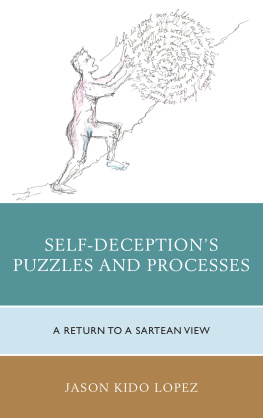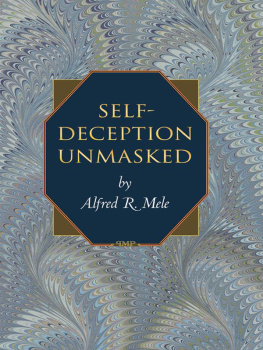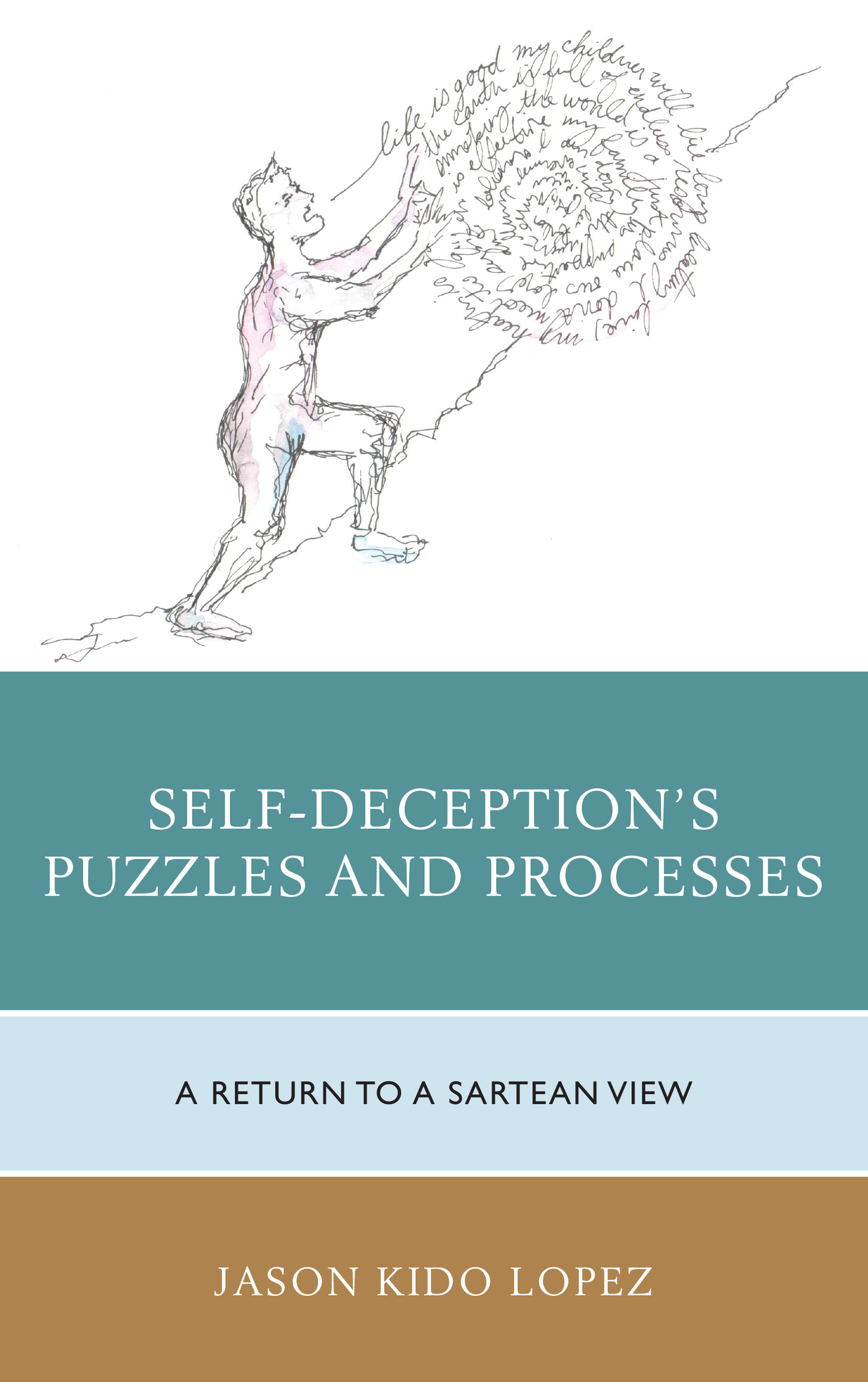Self-Deceptions Puzzles and Processes
Self-Deceptions Puzzles
and Processes
A Return to a Sartrean View
By Jason Kido Lopez
LEXINGTON BOOKS
Lanham Boulder New York London
Published by Lexington Books
An imprint of The Rowman & Littlefield Publishing Group, Inc.
4501 Forbes Boulevard, Suite 200, Lanham, Maryland 20706
www.rowman.com
Unit A, Whitacre Mews, 26-34 Stannary Street, London SE11 4AB
Copyright 2016 by Lexington Books
All rights reserved. No part of this book may be reproduced in any form or by any electronic or mechanical means, including information storage and retrieval systems, without written permission from the publisher, except by a reviewer who may quote passages in a review.
British Library Cataloguing in Publication Information Available
Library of Congress Cataloging-in-Publication Data
Names: Lopez, Jason Kido, author.
Title: Self-deceptions puzzles and processes : a return to a Sartrean view / Jason Kido Lopez.
Description: Lanham : Lexington Books, 2016. | Includes bibliographical references and index.
Identifiers: LCCN 2016024841 (print) | LCCN 2016025867 (ebook) | ISBN 9780739179901 (cloth : alkaline paper) | ISBN 9780739179918 (electronic)
Subjects: LCSH: Sartre, Jean-Paul 19051980. | Self-deception.
Classification: LCC B2430.S34 L67 2016 (print) | LCC B2430.S34 (ebook) | DDC 128dc23 LC record available at http://lccn.loc.gov/2016024841
 TM The paper used in this publication meets the minimum requirements of American National Standard for Information Sciences Permanence of Paper for Printed Library Materials, ANSI/NISO Z39.48-1992.
TM The paper used in this publication meets the minimum requirements of American National Standard for Information Sciences Permanence of Paper for Printed Library Materials, ANSI/NISO Z39.48-1992.
Printed in the United States of America
For Lori, my better half
Preface
A funny phenomenon occurs occasionally when I mention to someone that I research self-deception. After some express interest in the topic, they will then immediately ask, What is it? There is a striking juxtaposition between seemingly knowing enough about something to evaluate it as interesting and having to ask what it is. What could cause such varied reactions in a person in a matter of moments?
I think I have the answer since, at one point, I first heard about self-deception and had a similar response. At first blush, the conjunction of the words self and deception seem to make perfect sense. Everyone, after all, has some idea both of what a self is and of what it means to deceive. If we have an understanding of these two ingredients, we should be able to combine them to cook up a conception of self-deception. It could also be that the merging of these two words conjures up examples of behavior: a friends, a family members, a coworkers, or even ones own.
But, at a second glance, a slew of questions occurs. Does self-deception mirror interpersonal deception? Doesnt interpersonal deception usually involve hiding things from the deceived? How could self-deceivers do that to themselves? Maybe they cant and this means that self-deception is something related to, but not identical with, what one normally thinks of when one thinks of interpersonal deception. But if this is so, then what is self-deception? What does it have in common with deceiving others? What is different? It is this avalanche of questions and potential answers that turns ones interest into puzzlement. What seemed intriguing is now mystifying. Or, to those who are like me, it becomes both.
Self-deceptions ability to appear to be both so familiar and so puzzling is what often drives conversation about it. Not only philosophers of mind and epistemologists, but also psychologists, religious thinkers, existentialists, biographers, and artists occasionally end up writing about this topic. And this is rightfully so, self-deception surely has widespread implications for who we are, how we relate to each other, and how we understand ourselves and others.
The purpose of this book is mainly to help clear up some of the
mystery about self-deception. Indeed, I will argue for and explicate a particular conception of self-deception: self-deceivers are those who intentionally use the strategies of normal interpersonal deception on themselves. Although the argument on the whole uses and responds to current analytic philosophers (i.e., the philosophers of mind and epistemologists mentioned above), it shouldnt be surprising to see exceptions. Indeed, great cases of self-deception can be found in the media and Ill take the opportunity to mention relevant cases from television shows when helpful. More importantly, the work of existentialists and psychologists will especially be relevant to motivating my view.
The use of psychological and existential works is not, unlike my decision to analyze television-based cases of self-deception, solely derived from personal preference. The contemporary literature on self-deception, and one school of thought in particular, often borrows insights from certain psychological theories. These have to be discussed because much of the contemporary views of self-deception revolve around them. Any current discussion of self-deception must deal with these psychological views. If psychology says a lot about where we are now in the research on self-deception, then existentialism tells us about its past. Ill say more about this in the introduction, but the contemporary analytic literature on self-deceptionthat is, what I am primarily responding to in this bookwas built around a set of puzzles Jean-Paul Sartre raised for bad faith. Everything written about bad faith in the analytic tradition after 1960 is, either directly or indirectly, a response to Sartres thinking. Interestingly, Sartre used two puzzles to help him define bad faith. These puzzles didnt show that bad faith was impossible or paradoxical, they helped explain what it is. Those writing on self-deception after Sartre correctly saw that the puzzles could apply to self-deception as well as bad faith, but made one important mistake: they took the puzzles to be paradoxes that need to be resolved or eliminated. They missed the fact that the puzzles, like they did for bad faith, could be what defines and explicates the nature of self-deception. I, for reasons to be laid out later, want to recommend using the puzzles instead of avoiding them. The notion of self-deception that results is an important one that has been overlooked by the current literature.
If self-deception is defined by these puzzles, then it turns out that the seemingly contradictory reaction to its study is perfectly appropriate. It will respect the idea that a person can literally deceive him- or herself, which hopefully is interesting and/or familiar to some. Additionally, if we use the puzzles in the way I recommend, then there is a way in which self-deception is essentially puzzling. It wont be paradoxical or impossible or opaque, but there is something about deceiving oneself that is best understood through two puzzles. By the end of this book, then, self-deception wont be as mysterious as it once seemed, but the fact that it is defined by a set of puzzles will make it so that it retains some of its original mystique.
Acknowledgments
When I first started researching self-deception and reading through the literature, I was amazed and somewhat intimidated by the diversity of thinking on the matter. It seemed that existentialists, analytic philosophers of mind and epistemology, psychologists and cognitive scientists, and religious thinkers across time all had something to say about the topic. I am very grateful, then, for all of the assistance, advice, and support I got from the very beginning of this project.
Next page












 TM The paper used in this publication meets the minimum requirements of American National Standard for Information Sciences Permanence of Paper for Printed Library Materials, ANSI/NISO Z39.48-1992.
TM The paper used in this publication meets the minimum requirements of American National Standard for Information Sciences Permanence of Paper for Printed Library Materials, ANSI/NISO Z39.48-1992.